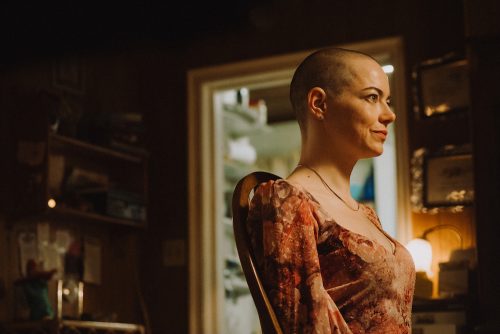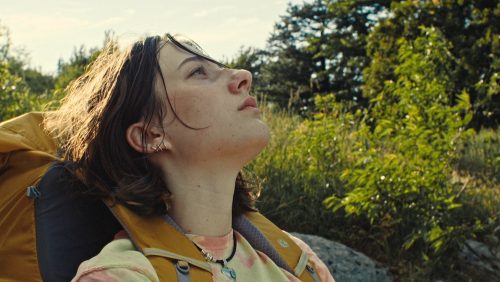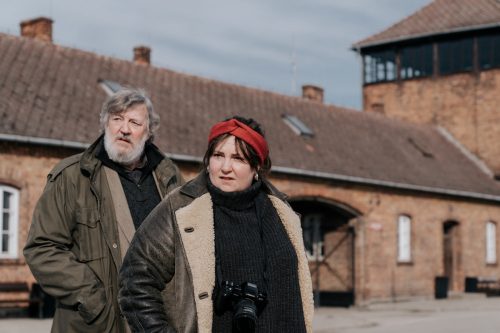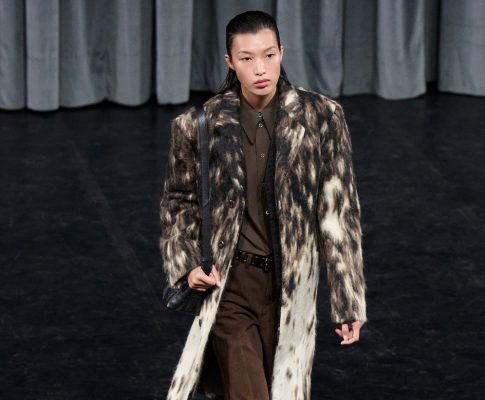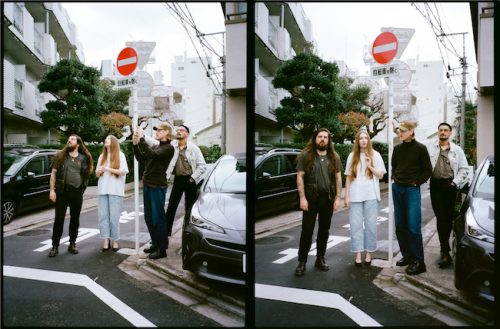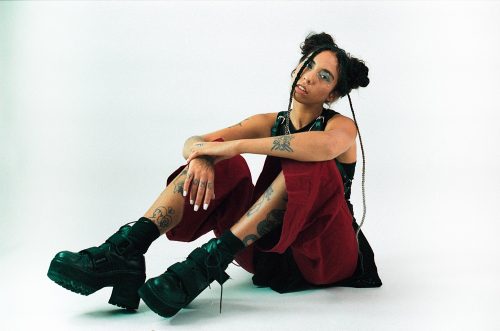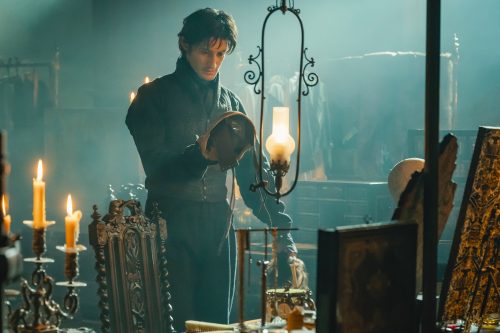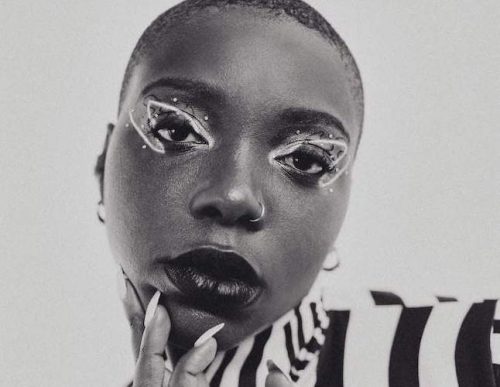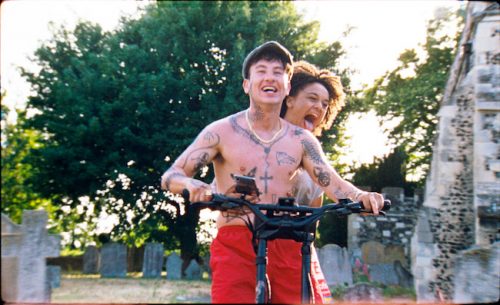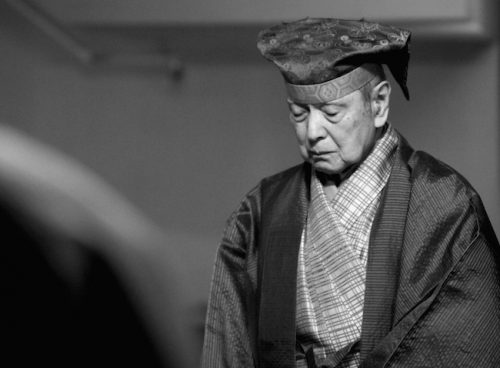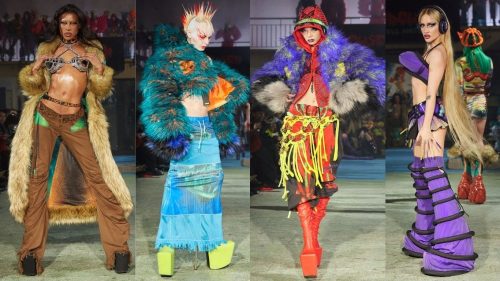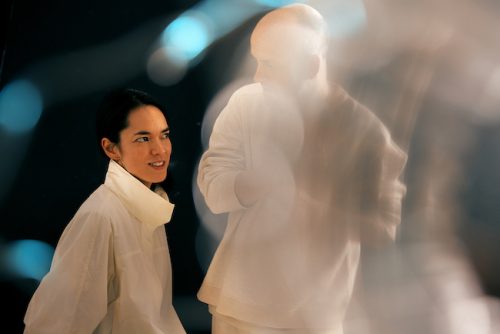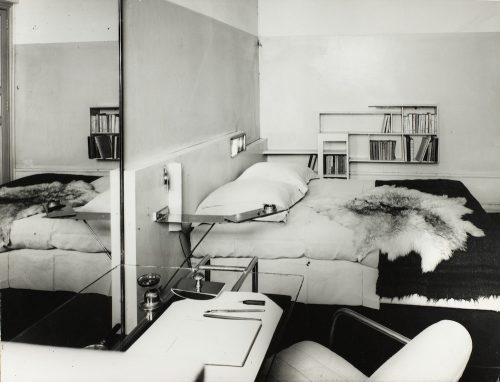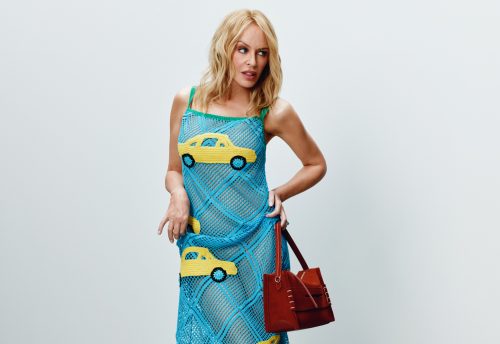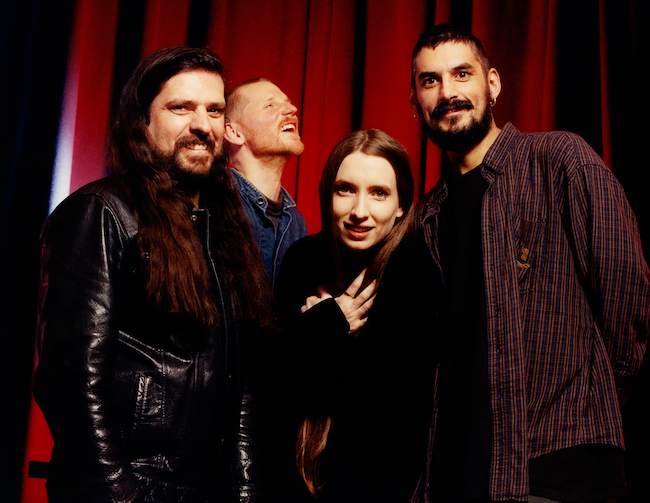
ーWe are very grateful that you are here with us today. We are looking forward to your debut album. From songwriting to recording, a lot of time and effort has been put into this. On top of that, covid-19 has had an immense impact on your creative process as well. Now that you will be releasing your album, how are you feeling?
Tom: It has been an evolution of feelings, from finishing it and hearing it back properly. Right now I’m proud of it. I think we worked hard on it and it paid off. I’m excited for people to hear it and share it with the world. There are a lot of people who are interested in what we do, and it is kind of time to share it.
Nick: I’m excited for it to be in the world now.
Florence: I’m also quite eager to let go of it as well. Letting it be public property rather than us sort of sitting on an egg. I want to be like “Take the egg!”.
ーCould you explain how you came together as a band? What was it that tied four of you together?
Tom: So Nick and Lewis were sorts of between bands, between projects, we were doing various things but not in a developed way. We decided to have a jam together, which was something we were talking about for a long time. After our karaoke session, we finally decided to do it. So we did it. In the next period, we write a bunch of songs and music that were used in the first EP. We then asked Florence to join and finished that EP and recorded it.
ーSo it was more social?
Florence: I think so, I think rather than what we had in common, in terms of musician intention, we all wanted to do something new that was unpredictable. That we were all at a point in our lives where we wanted to do something that we didn’t know was going to happen. Something fun, something new and experimental, I think that was what we shared in common, and still do.
Tom: Yea. We had that awareness, we wanted that to happen in our lives. None of us has children or houses or things. That’s why we were already up for that. We were ready for something big or unpredictable. I will also say our band is an expression of a larger group of friends. I met my girlfriend through Florence, they were school friends.
Nick: I also met my girlfriend through Florence.
Florence: If anyone needs a girlfriend.
Tom: Yes she is a matchmaker. I studied with Flor, we worked together and talked a lot about art. Nick and Lewis were in bands together for about 15 years. Something crazy like that. My girlfriend and Nick’s girlfriend are sisters and Lewis and my girlfriend are best friends. My girlfriend was going to be the best man at his wedding. So the connections between everyone, it does feel like an expression of a group of friends. We are a much bigger community.
Nick: The idea of the band as a social thing, is a huge thing. It’s not like an office job where you get together and plan what music you are going to make and clock off at 5. The thing is I felt as much as missing a musical project, I miss the social aspect of being in a band. When I started it felt like a big gap.
ーIn terms of the music, what ideas or plans did you have? Or did you not have one? Nick, Tom and Lewis you three have been in bands for 10 years. In that time you would have played different music. On the other hand, Florence, vocals, have never performed publicly. How did all four of you come together to form a style?
Tom: There was some kind of presidence to do something simple and fulfilling to listen to. We wanted to be a good live band, that was a key theme. When we first started, we were chucking around early garage rock and ESG stripped-down post-punk, something that’s fun to listen to. But there wasn’t a goal. I don’t remember bringing lots of ideas that were distorted. It was trimming a lot of that off.
Nick: The exciting process of starting a democratic project and experimenting like that. Everyone brings something and you chuck it in to see what happens. Then you try to evaluate it and learn from it. It’s exciting, that melting point.
Tom: I think more than definable, stylistic influences or goals, what you are hearing are personalities moulding together. What you hear from my instrument is my personality. I think that of the others. When you hear Lewis’s base, in my mind, that’s his personality. Same with Nick. When Nick plays the drum I know those drums are his personality. Same with Florence’s vocals. When you are trying to form a sound, that what’s going on at the surface, you just don’t know it.
Nick: Yea. It’s so exciting to work that way. What the alternative would be really. It’s no guarantee of success working like this. To be like “Let’s all get together and see what happens”. The alternative would be quite weird to start a band that sounds like mid-70s David Bowie. Then we will have to nail that thing. That’s something stupid. A lot of people do that you know.
ーI was going to ask you what artists or records inspired you to make your music. I’m guessing artistic influence isn’t as important for you.
Tom; It is interesting what you said, because the influences we use, we all dig, and as a side issue some people have preferences. We do have fundamental ones that everyone agrees with, and other songs are just for you and you bring a bit of that in. I wouldn’t say any of those you mentioned were the fundamental ones. Before Florence joined, I showed the guys a band called The Necessaries. They had the early REM sounds which have become a jangly, slightly pastoral, American post-punk sound. Arthur Russell was in that band, that’s maybe where Russell comes from.
Florence: The funny thing is though, is that you guys were listening to the Necessaries, but then there is always this weird element of three of us know the music or it will be the first time hearing it for one of us. That does seem to be like a theme. Like a Venn diagram and it’s never one.
Tom: Even Yuzo Koshiro that we were talking about before, I don’t think Lewis has professed any interest in it.
Florence: He hates it. But again I think that’s the strength of it. That’s why it’s hard to pin down because it isn’t like four people that love the same thing. There are bands that we all like a lot. We all like B-52 a lot and that’s not just because of their music, it’s their whole persona and humor in it and their artwork. That band is compelling. We were all at some point into Deftones. I have no idea how that has anything to do with anything. It’s just a coincidence I guess, and it’s funny. The bands that we are in have little to do with our actual music.
Nick: There is also quite a big difference between being influenced by something and referencing something. The way influence works are that it seeps into what you are doing. It’s a collection of influence throughout your life, your recent history that has seeped into your performance or approach. And referencing does happen, it’s still valuable but it’s a different thing. Where you go for something more specific and often it is what makes it easier to communicate between a group.
ーYour band is situated in South London. In the past few years, a band based in window mill live houses have been attracting attention. (Shame, Goat Girl, Black Country Communion, New Road etc.) You guys don’t identify with the South London Music scene. What types of music scenes, bands do you think you are associated with , or share ideas with.
Florence: In terms of the same ideas, I’m not sure. But in terms of bands we are friendly with, would be Pozi who we toured with. We have a real affinity with them. There is also a band called Dog Chocolate who we are friends with. They are really interesting artists and Matt works as a promoter as well. He does reviews of records. We’ve kind of known them in various ways for a long time. We met Pozi through doing a band but Dog Chocolate we kind of already knew through art. They both from London and several members of both bands live in south London. It’s beyond that. If it weren’t for the pandemic, we would have met loads of bands by now. Just as we started to gig regularly and tour, we were meant to tour PVA last year who were also really sweet people. But because of the pandemic, it didn’t happen. They supported us once at the Lexington, and they were amazing so we were keen on going on tour with them. That kind of didn’t happen. Almost these little beginnings of connections with other bands were happening but they were brutally cut off. It’s a funny situation and it would be very different if it wasn’t the pandemic.
Tom: I think also in our friendships, a lot of my friends have been in bands as long as I have, I still keep in touch with people. Some of them are still in the state of flux I was in when I started Dry Cleaning. It’s not easy to define that my mates are in this band or another band. You are in a self-made community of musicians. Like when we needed something to practice, I’ve got a mate that runs a studio and we went there. It’s not easy to find, but it’s still quite potent.
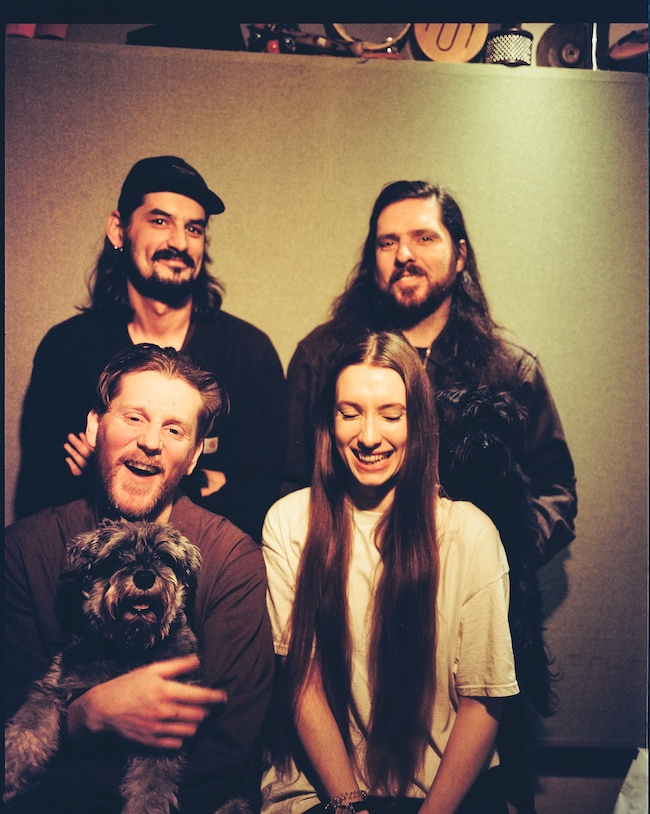 >
>
ーYea, people don’t talk about genre anymore. It still exists but maybe less. Maybe the music scene as well. Specifically which music scene do you belong to.
Tom: People just talk about post-punk a lot.
Florence: The internet has kind of made scenes less necessary for the development of the band or the spreading of the word. When we played a handful of gigs, we had quite a lot of people listening to it online. Some were not even in the same country as us. People were listening to it in the US. We haven’t toured there, not even close. We barely played shows in London, so it’s amazing how you could make a lot of progress without a scene. While in the past it was essential to have a support network. It sounds funny and great.
Tom: I could sort of understand why people would like to have a scene. It’s a nice idea, a romantic idea. Particularly if you live in London, I don’t know how you could even foster a scene in London because people live economically precarious. You have to work a lot to live in London. You don’t have a huge amount of leisure time and usually, you are exhausted in the evenings. Instead of going to a show that you don’t know the band, you would probably Netflix at home. London life is very difficult. When you look at things like the Washinton DC or Seattle scene, certain circumstances make those scenes flourish beyond the music itself.
Florence: Yea, free time and cheap space.
Nick: The scene is still a music industry commodity because it is marketable. I think the South London scene is certainly been burnished by the press in the music industry to make more of it. People talk about it but we don’t necessarily been put into that set of bands. I would say internationally that there is more awareness of younger proper British bands who do a spoken vocal style. We were been put into that, young post punky bands which is a specific style of singing. Which again we barely know any of these bands. It’s quite an unusual thing. But there is a subconscious effort by the music industry to jump onto these trends. And it’s possible that we kind of benefitted from that in certain ways. It just so happens to have a crop of bands coming up that have some cross over in their style. If that scene is trendy or popular in the music industry, we may be signed to the label for that reason.
Tom: I think that’s a really good point because there is a perception that London is a place where scenes are cropped up. Quite a lot of it is financial. When you hear about Sex pistols, Raincoats, a lot of them were able to squat in West London so they are not spending any money. We even had tutors in my university that said I should start out living in London in a Squat. The squat scene in London is barely existent. You got that community that lives up in Tottenham in the New River Studios. But certainly, I don’t know anyone living in South London who functions in a squat and put gigs on.
Nick: Probably about ten years ago, there was a big media effort to get rid of squatters. It was present for a long time in London but there was a rise in the squatting movement because there were so many buildings in the centre of London that aren’t occupied. After all, they bought as a tax right off the buildings. There are beautiful old grand buildings that are empty and they were being squatted illegally. People were protesting against the rise of property prices in London and the availability of reasonable accommodation for people to live in. It was like a political movement. And there was like huge media campaigns to get squatters out. They were portrayed as bad bad people eventually. Since then, in the last ten years, the movement died down.
ーI think a lot of Japanese people didn’t know about this.
Tom: Yes it’s important to know that because London was the place for property development and everything. There is terrible stuff that they did especially in Camden. Which they aggressively took over these places, and blended them with what were interesting music scenes and venues. They just couldn’t afford to survive. So it is interesting when people ask about the scene because it was cleansed.
Nick: That’s a really good point because it goes hand in hand with the absolution with music venues in London. Places that can’t open, but they have been there for years. They can’t operate anymore because people are building flats above and people want to sleep.
ーFlorence, you studied illustration and was teaching illustration. What were you working on at that time?
Florence: I was working as an artist and supporting that by doing a different kind of jobs. Just working to support my artistic practice. So I had a studio in Peckham, I still have one in Camberwell now. So I make drawings, prints, I do marbling a lot. I make monoprints and I do exhibitions and collaborative shows. I used to have a few collaborative shows with the drummer in Dog Chocolate, Jono Allen. We used to do shows, little exhibitions together. So that was what I was doing for about ten years. I still do now.
ーFlorence, your spoken vocal style is a key element in Dry Cleaning. Do you think that experience as a visual artist has an impact on the music that you make in the band?
Florence: I think so. Doing lots of interviews, it’s a good opportunity to think about that because we do get asked about that a lot. It occurred to me that in the beginning, Dry Cleaning seemed like a new medium. It was like what I did before through drawings, prints, sculptures and films, now it is with talking and words. It feels like the same work but it feels like investigating the same themes that I was preoccupied with but now it’s audio and poems.
Tom: I have to agree actually. As a visual artist, that connection should be a more useful thing for a musician when you think about yourself as a visual artist that makes music. My attraction to the guitar in the first place was because it seemed to be able to create the same feelings I got from drawing. When a piece of music comes up, it does create images in my head. The sounds trigger visual themes. If you look at a piece of art that I have made and listen to the way I play the guitar I think they are quite similar. You can see personality in both. The sort of emotional or character traits in a piece of visual art that I have made, and the way I make and perform music, you can see the similarity. They bring a few links.
ーFor this album, “New Long Leg”, was there a shared idea, concept and how did you explore those ideas? Was there anything new you tried for this album?
Florence: We wanted it to be a world of its own.
Tom: It certainly was becoming more textural. There was a richer texture to it. The song was becoming little journeys in themselves. So they were less similar and less thin. There is room to immerse your ears into a bit more. There were adjustments to how we were playing. Lewis started to play with his fingers a little more, which was the quality of being more even and more dubby. Slightly more gentle, no less repulsive, you could hear more note. Certainly, on the guitar, I started to make more odd textures. I was influenced by science fiction and I wanted this kind of weird, wobbly, wonky kind of sound. We started to use the drum machine as well which added another layer. So there were lots of different textures.
ーOther than that any new approach?
Nick: After recording Boundary Road, I think there was a certain element of not knowing we were recording an album. So you were just going back into the studio just to rehearse. There are all sorts of things on the agenda like the last EP was cool, how do we want to move on from there, individually how we wanted to progress. And when you put all these things into the pot there isn’t a recipe for doing the next thing. Just kind of doing what you did and trying to push it further along.
Tom: You are just trying to respond to little bits of excitement you are getting. For example, hearing different things on the van on tour. You are just building a cloud of things you are interested in, in your head. and you can’t wait to get back into the room with everyone and pour some of this out. I have always been aware of Black Sabbath but I have never listened to it or enjoyed it as much. Until Lewis showed it to me. His enthusiasm for it kind of wore off on me and got me interested in it. When we got back to the room, it’s almost like a lady came out from me and I tried to hit a riff that was inspired by the enthusiasm I had for the 70s heavy metal sounds. So that’s how it works. It’s because you are excited about that, it’s not a conscious decision.
Nick: There is also this idea that when you do know that you have an album and you are going to record an album, you are going to record it over a long period. It’s going to be a lot of work that goes into it. There’s also this idea of how much the songs are going to change in the studio. There is a big question mark on the idea of what the production is going to bring to your music and what it would sound like afterwards.
Simon who was talking about earlier, 4AD. He said a nice thing to us when we were in New York. We wrote the majority of the album and he said to us you don’t need to reinvent the wheel to do this. That was like a real spotlight and a great moment of clarity. He wasn’t expecting us to produce like an EDM concept album. It’s nice sometimes to hear those reassuring things from people whose opinion carry a lot of weight.
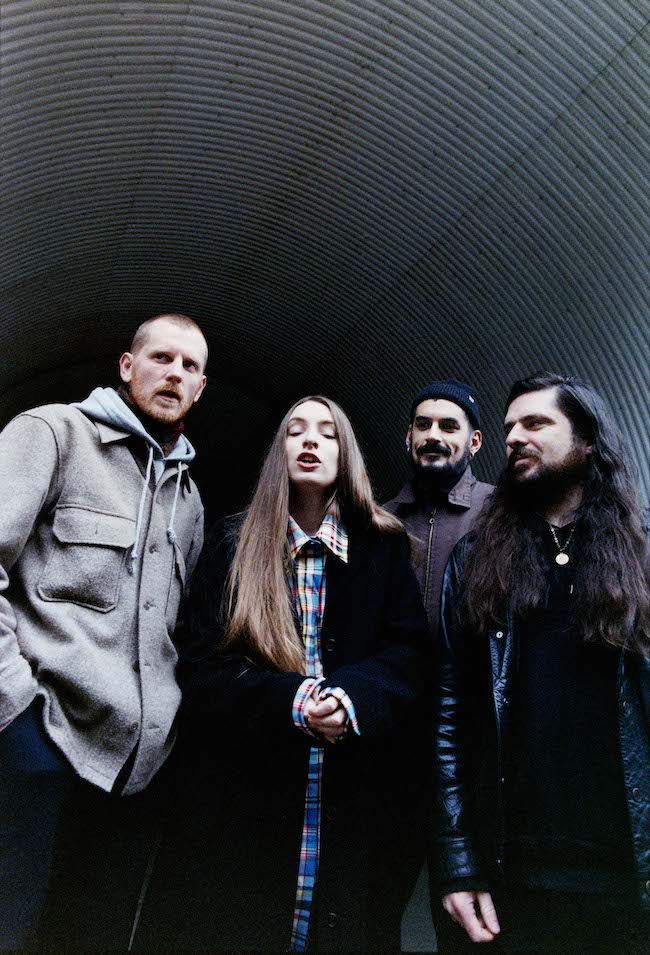
ーYou had the great opportunity to work with John Parish, famous from PJ Harvey. What led you to work with him, and what are your thoughts on his previous works. During the collaboration, was there anything memorable?
Florence: He was a name that came out quite early when we were looking at produces. It was also about who was in the UK because in other years it was a consideration of going overseas and record, but we wanted to make the album now. So when the lockdown lifted in the summer, he was very enthusiastic about it. We were extremely excited that he was interested because we didn’t think it was a given at all. Because we were sending him an email like a shot in the dark. People tend to play it cool, but he was like “I like this, let’s get on a call”. As soon as we were on a call, it wasn’t a lot of small talks. We started talking about his notes on the demos straight away. That made us feel really good, and it was uncomplicated.
Tom: It was cool as well because he watched a lot of videos of us playing live. His comment was like “You can play so that’s what we will do when we record it”. That was reassuring. Everyone was up for just playing.
ーIn this album dislocation, escapism, daydreaming, complicated feelings of love, anger, revenge, anxiety, the kitchen, lethargy, forgetfulness, and survival are the themes. In the way, Brexit was the main motif in “Strong Feelings”, what was your ideas or inspiration in this album lyrics? Do you think the lyrics are more personal or are they more social, about the world around you?
Florence; I would say it’s my current mood, or where I am, my surroundings, my worries, my fears at the time of writing the music would have a big impact on my music whether I want them to or not. Sometimes I think they haven’t had an impact but later on I would read the lyrics and I feel much more exposed.
Writing this album we were very busy with the band throughout the writing period. It was no different to when I wrote the first two EPs because I was working several jobs. So lots of things were written on buses and trains in stolen bits of time. No real calm writing sessions, just lots of grabbing bits. But I wrote quite a few of the lyrics during the lockdown in the months preceding the recording. At one time I wrote at rock field as well, in the evenings or mornings of the recordings. So there is an influence in terms of the lockdown. The claustrophobic anxiety-inducing sort of world also the weird domestic bubble, quite a lot of those ideas are on the album. Some of it was written before but sort of chimes with the situation but some of them were written about that.
ーYou previously released the song “Magic of Meghan”, used Megan as a symbol to discuss women’s role in society. Your music created awareness about the norm of women degradation. The recent news on Megan has shed light on this issue once again. What are your thoughts on Megan now?
Florence: In the UK especially there is a whole section of society that seems to hate her guts and I don’t get it. It shouldn’t be such a huge news story as it is the amount of attention of it is mad and the negative attention she gets is inexplicable to me. In terms of the interview itself, I watched it the other day, I don’t think they said anything particularly controversial. I mean it’s awful that Harry was asked about what skin colour she would be and that is unfathomable. At the same time, I’m not surprised. The fact that it caused a splash, I think people are quite naive of this.
Tom: I think what we see from this interview is that the royal symbolise a whole range of complex values, a sense of Englishness, a sense of class, a sense of privilege, a sense of order. These are how things are done and when they see someone like Meghan come along and challenges those values and people have violent reactions. They don’t want it. and that is so sad because it is insignificant and it is two people that are in love and that’s the real takeaway and they are building a great family. They are interesting people, but it’d just so sad that we are limited to change in this country about people. And sometimes to their detriment, they uphold those values.
Florence: I was disappointed to see the upholding of that British Idea to stay quiet by your own emotions, and how putting up with things is a strength. I was disappointed to see them trotting out that idea that history repeats itself. It’s shocking to see that they are so unaware that it should be left in the past. It’s a very British thing to put-ups to stuff no matter the amount of emotional strain is strong.
Tom: Or the consequences. As long as it’s not seen, and you don’t talk about it, it’s just an hour underneath the surface. Just don’t talk about it.
Nick: Touching on what Tom said, the symbolism of the Royal Family, is class. It’s like the big themes of our time. Its racism, nationalism, post-colonialism, all these massive issues are in our faces now. ready to be confronted. The country wants to shy away from those things. As opposed to taking them on in such a brutal sense.
ーThank you for today!
Dry Cleaning: Thank you so much, that was enjoyable. We will see you in Japan one day
text Junnosuke Amai(TW)
edit Ryoko Kuwahara(TW/IG)
editorial assistant Maya Lee(IG)
